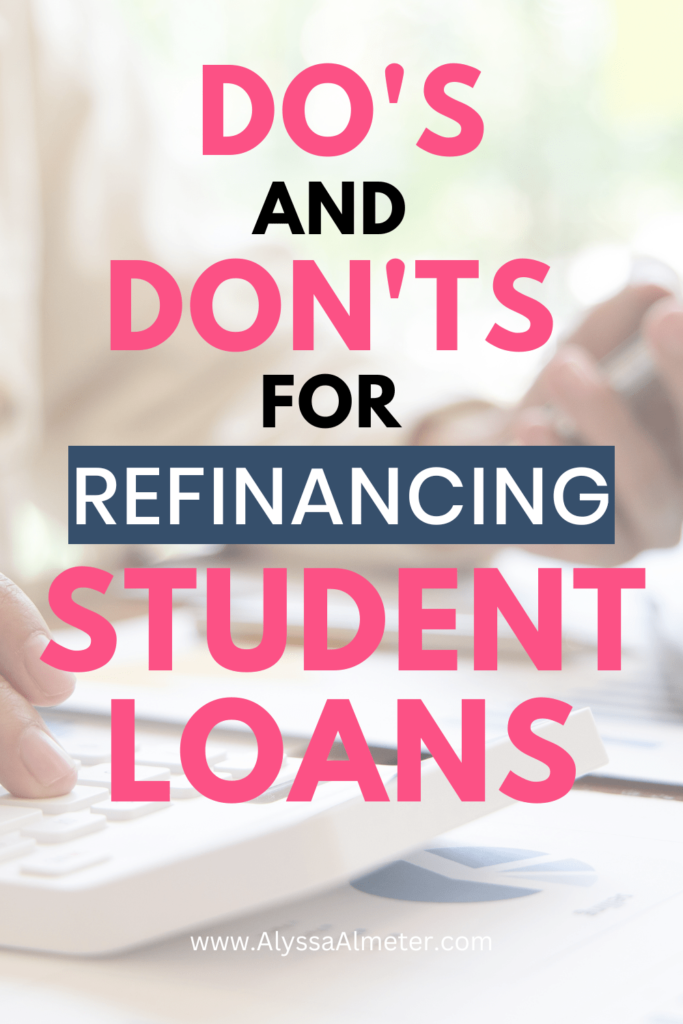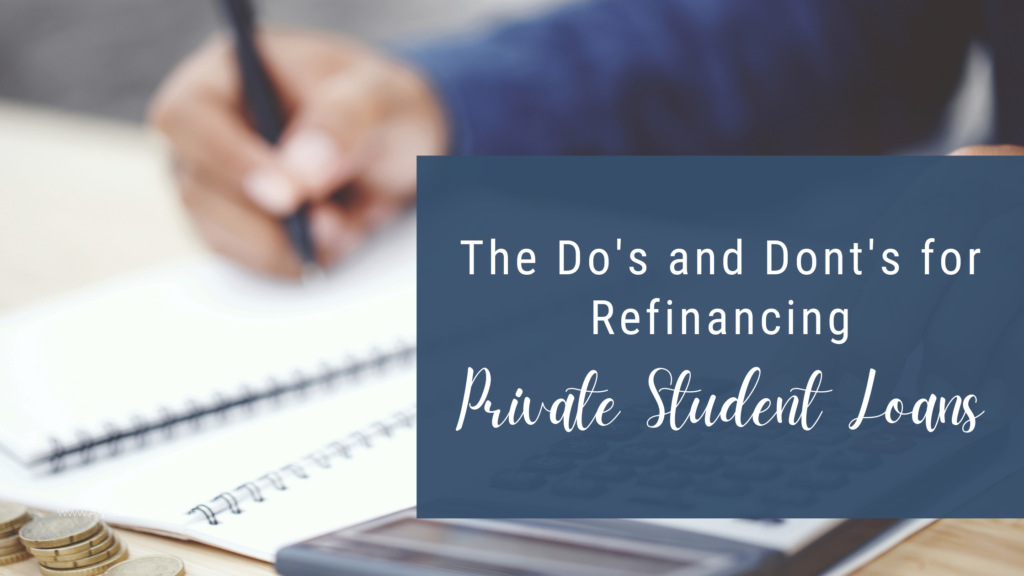Disclaimer: This post contains a referral link to Splash Financial. If you use my referral link and decide to refinance with Splash Financial, I may earn a commission at no additional cost to you. For more information on the Refer a Friend Program see their Terms and Conditions.
Have you ever thought about refinancing your private student loans?
The 2020 CARES Act has put repayments on hold the last 3 years for federal student loan borrowers, but that still leaves $130 billion dollars of outstanding private student loan debt. According to the Student Loan Debt Statistics by Educationdata.org, private student loan debt makes up 7% of the national student loan debt.
$130 Billion!
That’s still a lot of borrowers that are making payments each month. If you have a high interest rate, refinancing to save some money might be a good option for you. Here are some things you will want to consider before refinancing.
What is Student Loan Refinancing?
Refinancing simply means that you are taking your current loan and turning it into a new loan. When you refinance, your new lender will pay your old lender the reminder of your balance and you will have new payment terms set up with your new lender.
There are certain scenarios that you will want to consider before you refinance through and that is what we will cover in the rest of this post.
What Kind of Student Loans Can I Refinance?
At the time of this post federal student loans are under forbearance under the CARES Act, which means everyone who has a federal student loan has 0% interest. There is no need to refinance federal student loans. But your goal should still be to pay off those loans using the debt snowball, even if repayments are currently frozen as well.
Private student loans, including Parent PLUS Loans are the types of loans you can look into refinancing if it works to your benefit. Private loans are loans that are not backed by the government and do not qualify for the forbearance under the CARES Act.

When is it a Good Idea to Refinance Private Student Loans?
You may want to consider refinancing your student loans if it helps you save money in the end. Here are some different factors.
Lower Your Interest Rate
Private student loans tend to have a higher interest rate than federal student loans. According to a Bankrate.com article, interest rates on private loans range from 4% to 15%. That’s a huge range!
Interest rates are set by multiple variables. If you have an interest rate on the higher end, it will help you save hundreds or thousands of dollars in the end if you refinance to a lower rate.
Go From a Variable Interest Rate to a Fixed Interest Rate
There are 2 types of interest rates; variable and fixed. A variable interest rate fluctuates from month to month. A fixed interest rate stays the same throughout your loan term.
It is more difficult to budget when you have a variable rate because your payment is different each month. Going to a fixed rate can help you plan out your payments. It can also save you some money to lock in a lower rate that you will never have to worry about going up in the future.
If you currently have a variable rate, refinancing is a good option to lock in a fixed rate.
No Additional Fees
Some banks may change service fees for refinancing, but not all. Look at the fine print and make sure you aren’t paying any fees for refinancing.

What NOT to Do When Refinancing Private Student Loans
Make sure you are benefiting from the refinancing so here are some things you don’t want to do.
Do Not Extend Your Loan Term
During the process of refinancing you may be offered a longer repayment term. This might be enticing because it usually gives you a smaller monthly payment.
Don’t fall for the trap!
Try to keep your repayment term as short as possible. The end goal here is to pay off debt quicker while also saving money.
Do Not Add a Cosigner
Whatever you do, do not add a cosigner to your loan (in any situation). Adding a cosigner to a loan can put a strain on the relationship if you miss payments. It’s not worth it.
On the flip side though, if you currently have a cosigner on your student loan then refinancing is an opportunity to remove them from your loan. Free them from your financial burden!
Do Not Lose Momentum
Refinancing should just be part of your overall debt payoff strategy. Don’t set it and forget it. Refinancing will help you save some money but you still want to work on your debt snowball to get them paid off for good!
Qualifications for Refinancing Private Student Loans
For banks to consider giving you a loan, you must meet some requirements. The qualifications are guidelines they use to determine how likely you will pay back you loan. Each lender will have different requirements but here is a general guideline for what they are looking for.
FICO is 700 or Greater
I’ve seen different baseline numbers for what is considered a “good” credit score according to bankers. 600 is probably a good start. Above 700 would be even better and “preferred” according to Splash Financial.
Although I’m not a big proponent of aiming to raise your credit score, it is an important number when refinancing.
The better your FICO score, the better (lower) interest you will receive.
Paying at least the minimum payments on your debts each month and not missing a payment will help boost your credit score.
Citizenship and Degree
In order to be eligible to refinance student loans with Splash Financial, you have to be a U.S. Citizen and have a degree.
Low Debt to Income Ratio
Splash Financial recommends that your current debt is no more than 30% of your annual income.
How Much Money Can Refinancing Save You?
Depending on your current loan balance and interest rate as compared to your possible new interest rate with refinancing, you may save hundreds or thousands of dollars in the end if you refinance.
If your current interest rate is at least a couple points higher than the advertised then it might be work applying to see what kind of new interest rate you are quoted.
Once you do that, use a refinance calculator to determine how much money you can possibly save.

Where Should I Refinance My Student Loans?
There are several refinancing companies out there and I’m sure you have heard of some of them. If you are seriously considering refinancing your student loans so you can save some money then I recommend going through Splash Financial.
For full disclosure I was never a customer of Splash Financial. I don’t currently have student loans but it would have been nice to know about them when I had loans with 8% interest. (But they weren’t around until 2013, when I paid off my last student loan.)
Ramsey Solutions recommends Splash Financial and I trust their due diligence when recommending companies because they are truly looking out for the consumer.
Benefits of Refinancing Private Student Loans with Splash Financial
At the time of this article Splash Financial is advertising fixed rates as low as 4.47% APR. If your current interest rate is higher than that then you can check your rate with Splash. It will just take a few minutes and it will not affect your crest score.
Spash Financial isn’t a bank. They work with several banks and credit unions to find you the best rate. Use this refinancing calculator to help you decide if refinancing is worth it.
Use My Referral Code and Get $200!
A refinancing company that gives you money? Yes, with Splash Financial’s Refer a Friend program, they may give you $200 if you decide to refinance at least $30,000!
That’s $200 you can use to pay down your debt, build your emergency fund, or do whatever you would like! Payments are sent via PayPal so it’s up to you how you want to spend the cash! You can look at their Refer a Friend page for details and eligibility.
Decide if Refinancing is Right For You
Now you know some basics of refinancing your student loans. If you think refinancing is the right option for you, review all the FAQ’s for additional information and apply for your new rate today. It doesn’t cost you anything to apply and it won’t hurt your credit report. Why give more money to the banks when you can keep it for yourself?

